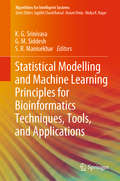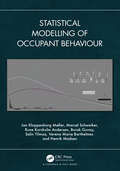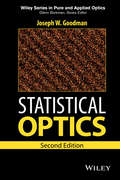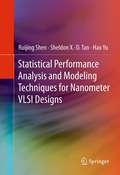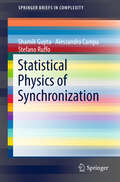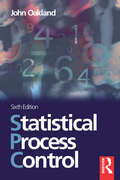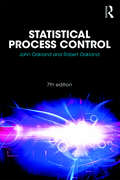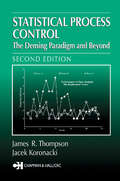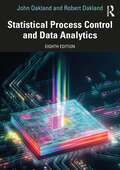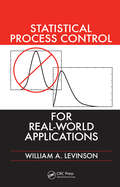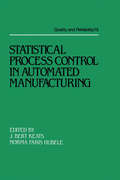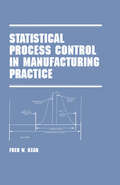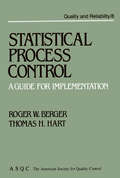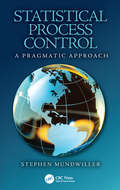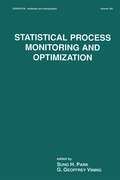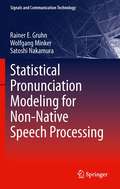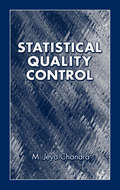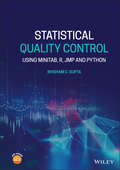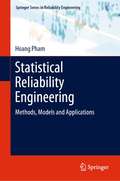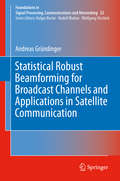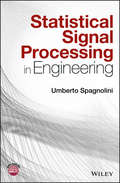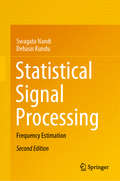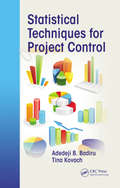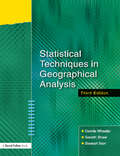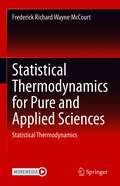- Table View
- List View
Statistical Modelling and Machine Learning Principles for Bioinformatics Techniques, Tools, and Applications (Algorithms for Intelligent Systems)
by K. G. Srinivasa G. M. Siddesh S. R. ManisekharThis book discusses topics related to bioinformatics, statistics, and machine learning, presenting the latest research in various areas of bioinformatics. It also highlights the role of computing and machine learning in knowledge extraction from biological data, and how this knowledge can be applied in fields such as drug design, health supplements, gene therapy, proteomics and agriculture.
Statistical Modelling of Occupant Behaviour
by Henrik Madsen Marcel Schweiker Jan Kloppenborg Møller Rune Korsholm Andersen Burak Gunay Selin Yilmaz Verena Marie BarthelmesDo you have data on occupant behaviour, indoor environment or energy use in buildings? Are you interested in statistical analysis and modelling? Do you have a specific (research) question and dataset and would like to know how to answer the question with the data available? Statistical Modelling of Occupant Behaviour covers a range of statistical methods and models used for modelling energy- and comfort-related occupant behaviour in buildings. It is a classical textbook on statistics, including many practical examples related to occupant behaviour that are either taken from real research problems or adapted from such. The main focus is traditional statistical techniques based on the likelihood principle that can be applied to occupant behaviour modelling, including: General, generalised linear and survival models Mixed effect and hierarchical models Linear time series and Markov models Linear state space and hidden Markov models Illustration of all methods using occupant behaviour examples implemented in R The built environment affects occupants who live and work in it, and occupants affect the built environment by adapting it to their needs – for example, by adapting their indoor environments by interacting with building components and systems. These adaptive behaviours account for great uncertainty in the prediction of building energy use and indoor environmental conditions. Occupant behaviour is complex and multi-disciplinary but can be successfully modelled using statistical approaches. Statistical Modelling of Occupant Behaviour is written for researchers and advanced practitioners who work with real-world applications and modelling of occupant data. It describes the kinds of statistical models that may be used in various occupant behaviour modelling research. It gives a theoretical overview of these methods and then applies them to the study of occupant behaviour using readily replaceable examples in the R environment that are based on actual and experimental data.
Statistical Optics (Wiley Series in Pure and Applied Optics)
by Joseph W. GoodmanThis book discusses statistical methods that are useful for treating problems in modern optics, and the application of these methods to solving a variety of such problems This book covers a variety of statistical problems in optics, including both theory and applications. The text covers the necessary background in statistics, statistical properties of light waves of various types, the theory of partial coherence and its applications, imaging with partially coherent light, atmospheric degradations of images, and noise limitations in the detection of light. New topics have been introduced in the second edition, including: Analysis of the Vander Pol oscillator model of laser light Coverage on coherence tomography and coherence multiplexing of fiber sensors An expansion of the chapter on imaging with partially coherent light, including several new examples An expanded section on speckle and its properties New sections on the cross-spectrum and bispectrum techniques for obtaining images free from atmospheric distortions A new section on imaging through atmospheric turbulence using coherent light The addition of the effects of "read noise" to the discussions of limitations encountered in detecting very weak optical signals A number of new problems and many new references have been added Statistical Optics, Second Edition is written for researchers and engineering students interested in optics, physicists and chemists, as well as graduate level courses in a University Engineering or Physics Department.
Statistical Performance Analysis and Modeling Techniques for Nanometer VLSI Designs
by Hao Yu Ruijing Shen Sheldon X.-D. TanSince process variation and chip performance uncertainties have become more pronounced as technologies scale down into the nanometer regime, accurate and efficient modeling or characterization of variations from the device to the architecture level have become imperative for the successful design of VLSI chips. This book provides readers with tools for variation-aware design methodologies and computer-aided design (CAD) of VLSI systems, in the presence of process variations at the nanometer scale. It presents the latest developments for modeling and analysis, with a focus on statistical interconnect modeling, statistical parasitic extractions, statistical full-chip leakage and dynamic power analysis considering spatial correlations, statistical analysis and modeling for large global interconnects and analog/mixed-signal circuits. Provides readers with timely, systematic and comprehensive treatments of statistical modeling and analysis of VLSI systems with a focus on interconnects, on-chip power grids and clock networks, and analog/mixed-signal circuits;Helps chip designers understand the potential and limitations of their design tools, improving their design productivity;Presents analysis of each algorithm with practical applications in the context of real circuit design;Includes numerical examples for the quantitative analysis and evaluation of algorithms presented. Provides readers with timely, systematic and comprehensive treatments of statistical modeling and analysis of VLSI systems with a focus on interconnects, on-chip power grids and clock networks, and analog/mixed-signal circuits;Helps chip designers understand the potential and limitations of their design tools, improving their design productivity;Presents analysis of each algorithm with practical applications in the context of real circuit design;Includes numerical examples for the quantitative analysis and evaluation of algorithms presented.
Statistical Physics of Synchronization (SpringerBriefs in Complexity)
by Shamik Gupta Alessandro Campa Stefano RuffoThis book introduces and discusses the analysis of interacting many-body complex systems exhibiting spontaneous synchronization from the perspective of nonequilibrium statistical physics. While such systems have been mostly studied using dynamical system theory, the book underlines the usefulness of the statistical physics approach to obtain insightful results in a number of representative dynamical settings. Although it is intractable to follow the dynamics of a particular initial condition, statistical physics allows to derive exact analytical results in the limit of an infinite number of interacting units. Chapter one discusses dynamical characterization of individual units of synchronizing systems as well as of their interaction and summarizes the relevant tools of statistical physics. The latter are then used in chapters two and three to discuss respectively synchronizing systems with either a first- or a second-order evolution in time. This book provides a timely introduction to the subject and is meant for the uninitiated as well as for experienced researchers working in areas of nonlinear dynamics and chaos, statistical physics, and complex systems.
Statistical Process Control
by John S OaklandStatistical Process Control (SPC) is a tool that measures and achieves quality control, providing managers from a wide range of industries with the ability to take appropriate actions for business success. Offering a complete instructional guide to SPC for professional quality managers and students alike, all the latest tools, techniques and philosophies behind process management and improvement are supported by the author’s extensive consulting work with thousands of organisations worldwide. Fully updated to include real-life case studies, new research based on actual client work from an array of industries, a new chapter on process capability, and integration with the latest computer methods and Minitab software, the book also retains its valued textbook quality through clear learning objectives and end of chapter discussion questions. It will serve as a textbook for both student and practicing engineers, scientists, technologists and managers and for anyone wishing to understand or implement modern statistical process control techniques.
Statistical Process Control
by John S Oakland Robert James OaklandThe business, commercial and public-sector world has changed dramatically since John Oakland wrote the first edition of Statistical Process Control – a practical guide?in the mid-eighties. Then people were rediscovering statistical methods of ‘quality control’ and the book responded to an often desperate need to find out about the techniques and use them on data. Pressure over time from organizations supplying directly to the consumer, typically in the automotive and high technology sectors, forced those in charge of the supplying production and service operations to think more about preventing problems than how to find and fix them. Subsequent editions retained the ‘took kit’ approach of the first but included some of the ‘philosophy’ behind the techniques and their use. The theme which runs throughout the 7th edition is still processes - that require understanding, have variation, must be properly controlled, have a capability, and need improvement - the five sections of this new edition. SPC never has been and never will be simply a ‘took kit’ and in this book the authors provide, not only the instructional guide for the tools, but communicate the management practices which have become so vital to success in organizations throughout the world. The book is supported by the authors' extensive and latest consulting work within thousands of organisations worldwide. Fully updated to include real-life case studies, new research based on client work from an array of industries, and integration with the latest computer methods and Minitab software, the book also retains its valued textbook quality through clear learning objectives and end of chapter discussion questions. It can still serve as a textbook for both student and practicing engineers, scientists, technologists, managers and for anyone wishing to understand or implement modern statistical process control techniques.
Statistical Process Control For Quality Improvement- Hardcover Version
by J. Koronacki J.R. ThompsonThe first edition of this groundbreaking text showed that the Statistical Process Control (SPC) paradigm of W. Edwards Deming was not at all the same as the Quality Control paradigm that has dominated American manufacturing since World War II. Its philosophy of good management is rooted in a paradigm as process-oriented as physics, yet produces a friendly and fulfilling work environment. This second edition broadens its view to reveal even more of Deming's philosophy and provides more techniques for use at the managerial level. It shows readers that CEOs and service industries need SPC at least as much as production lines, and it offers precise methods and guidelines for their use.
Statistical Process Control and Data Analytics
by John Oakland Robert OaklandThe business, commercial and public-sector world has changed dramatically since John Oakland wrote the first edition of Statistical Process Control in the mid-1980s. Then, people were rediscovering statistical methods of ‘quality control,’ and the book responded to an often desperate need to find out about the techniques and use them on data. Pressure over time from organizations supplying directly to the consumer, typically in the automotive and high technology sectors, forced those in charge of the supplying, production and service operations to think more about preventing problems than how to find and fix them. Subsequent editions retained the ‘tool kit’ approach of the first but included some of the ‘philosophy’ behind the techniques and their use.Now entitled Statistical Process Control and Data Analytics, this revised and updated eighth edition retains its focus on processes that require understanding, have variation, must be properly controlled, have a capability and need improvement – as reflected in the five sections of the book. In this book the authors provide not only an instructional guide for the tools but communicate the management practices which have become so vital to success in organizations throughout the world. The book is supported by the authors' extensive consulting work with thousands of organizations worldwide. A new chapter on data governance and data analytics reflects the increasing importance of big data in today’s business environment.Fully updated to include real-life case studies, new research based on client work from an array of industries and integration with the latest computer methods and software, the book also retains its valued textbook quality through clear learning objectives and online end-of-chapter discussion questions. It can still serve as a textbook for both student and practicing engineers, scientists, technologists, managers and anyone wishing to understand or implement modern statistical process control techniques and data analytics.
Statistical Process Control for Real-World Applications
by William A. LevinsonThe normal or bell curve distribution is far more common in statistics textbooks than it is in real factories, where processes follow non-normal and often highly skewed distributions. Statistical Process Control for Real-World Applications shows how to handle non-normal applications scientifically and explain the methodology to suppliers and custom
Statistical Process Control in Automated Manufacturing
by Bert KeatsThis book provides an introduction to statistical process control in automated manufacturing and suggests implementation strategies. It focuses on time series applications in statistical process control and explores the role of knowledge-based systems in process control.
Statistical Process Control in Manufacturing Practice
by Fred W. KearEmphasizing the importance of understanding and reducing process variation to achieve quality manufacturing performance, this work establishes how statistical process control (SPC) provides powerful tools for measuring and regulating manufacturing processes. It presents information derived from time-tested applications of SPC techniques at on-site process situations in manufacturing. It is designed to assist manufacturing organizations in explaining and implementing successful SPC programmes.
Statistical Process Control: A Guide for Implementation (Quality And Reliability Ser. #8)
by Roger W. Berger Thomas H. HartThis guide aims to strip away the mystery surrounding statistical process control and to present its concepts and principles in as simple and straightforward a manner as possible. It is directed primarily at American business managers.
Statistical Process Control: A Pragmatic Approach (Continuous Improvement Series)
by Stephen MundwillerPeople with minimal math skills, and even those with advanced math skills, have difficulty grasping the intuitive concepts behind Statistical Process Control (SPC). Many practitioners do not understand the concepts behind Control Charts, the differences of out of control and out of specification, and the process variation on Control Charts. This book will explain these concepts by using a simple methodology that will bring a much greater level of understanding to those that use it by providing a detailed description of the method, using common language, real-world examples to illustrate the concept, and instructions on easy implementation.
Statistical Process Monitoring and Optimization (Statistics: A Series of Textbooks and Monographs)
by G. Geoffrey Vining Sung H. ParkDemonstrates ways to track industrial processes and performance, integrating related areas such as engineering process control, statistical reasoning in TQM, robust parameter design, control charts, multivariate process monitoring, capability indices, experimental design, empirical model building, and process optimization. The book covers a range o
Statistical Pronunciation Modeling for Non-Native Speech Processing
by Wolfgang Minker Rainer E. Gruhn Satoshi NakamuraIn this work, the authors present a fully statistical approach to model non--native speakers' pronunciation. Second-language speakers pronounce words in multiple different ways compared to the native speakers. Those deviations, may it be phoneme substitutions, deletions or insertions, can be modelled automatically with the new method presented here. The methods is based on a discrete hidden Markov model as a word pronunciation model, initialized on a standard pronunciation dictionary. The implementation and functionality of the methodology has been proven and verified with a test set of non-native English in the regarding accent. The book is written for researchers with a professional interest in phonetics and automatic speech and speaker recognition.
Statistical Quality Control
by M. Jeya ChandraIt has recently become apparent that "quality" is quickly becoming the single most important factor for success and growth in business. Companies achieving higher quality in their products through effective quality improvement programs enjoy a significant competitive advantage. It is, therefore, essential for engineers responsible for design, devel
Statistical Quality Control: Using MINITAB, R, JMP and Python
by Bhisham C. GuptaSTATISTICAL QUALITY CONTROL Provides a basic understanding of statistical quality control (SQC) and demonstrates how to apply the techniques of SQC to improve the quality of products in various sectorsThis book introduces Statistical Quality Control and the elements of Six Sigma Methodology, illustrating the widespread applications that both have for a multitude of areas, including manufacturing, finance, transportation, and more. It places emphasis on both the theory and application of various SQC techniques and offers a large number of examples using data encountered in real life situations to support each theoretical concept.Statistical Quality Control: Using MINITAB, R, JMP and Python begins with a brief discussion of the different types of data encountered in various fields of statistical applications and introduces graphical and numerical tools needed to conduct preliminary analysis of the data. It then discusses the basic concept of statistical quality control (SQC) and Six Sigma Methodology and examines the different types of sampling methods encountered when sampling schemes are used to study certain populations. The book also covers Phase 1 Control Charts for variables and attributes; Phase II Control Charts to detect small shifts; the various types of Process Capability Indices (CPI); certain aspects of Measurement System Analysis (MSA); various aspects of PRE-control; and more. This helpful guide alsoFocuses on the learning and understanding of statistical quality control for second and third year undergraduates and practitioners in the fieldDiscusses aspects of Six Sigma MethodologyTeaches readers to use MINITAB, R, JMP and Python to create and analyze chartsRequires no previous knowledge of statistical theoryIs supplemented by an instructor-only book companion site featuring data sets and a solutions manual to all problems, as well as a student book companion site that includes data sets and a solutions manual to all odd-numbered problemsStatistical Quality Control: Using MINITAB, R, JMP and Python is an excellent book for students studying engineering, statistics, management studies, and other related fields and who are interested in learning various techniques of statistical quality control. It also serves as a desk reference for practitioners who work to improve quality in various sectors, such as manufacturing, service, transportation, medical, oil, and financial institutions. It‘s also useful for those who use Six Sigma techniques to improve the quality of products in such areas.
Statistical Reliability Engineering: Methods, Models and Applications (Springer Series in Reliability Engineering)
by Hoang PhamThis book presents the state-of-the-art methodology and detailed analytical models and methods used to assess the reliability of complex systems and related applications in statistical reliability engineering. It is a textbook based mainly on the author’s recent research and publications as well as experience of over 30 years in this field. The book covers a wide range of methods and models in reliability, and their applications, including: statistical methods and model selection for machine learning; models for maintenance and software reliability; statistical reliability estimation of complex systems; and statistical reliability analysis of k out of n systems, standby systems and repairable systems. Offering numerous examples and solved problems within each chapter, this comprehensive text provides an introduction to reliability engineering graduate students, a reference for data scientists and reliability engineers, and a thorough guide for researchers and instructors in the field.
Statistical Robust Beamforming for Broadcast Channels and Applications in Satellite Communication (Foundations in Signal Processing, Communications and Networking #22)
by Andreas GründingerThis book investigates adaptive physical-layer beamforming and resource allocation that ensure reliable data transmission in the multi-antenna broadcast channel. The book provides an overview of robust optimization techniques and modelling approximations to deal with stochastic performance metrics. One key contribution of the book is a closed-form description of the achievable rates with unlimited transmit power for a rank-one channel error model. Additionally, the book provides a concise duality framework to transform mean square error (MSE) based beamformer designs, e.g., quality of service and balancing optimizations, into equivalent uplink filter designs. For the algorithmic solution, the book analyses the following paradigm: transmission to receivers with large MSE targets (low demands) is switched off if the transmit power is low. The book also studies chance constrained optimizations for limiting the outage probability. In this context, the book provides two novel conservative outage probability approximations, that result in convex beamformer optimizations. To compensate for the remaining inaccuracy, the book introduces a post-processing power allocation. Finally, the book applies the introduced beamformer designs for SatCom, where interference from neighboring spotbeams and channel fading are the main limitations.
Statistical Signal Processing in Engineering
by Umberto SpagnoliniA problem-solving approach to statistical signal processing for practicing engineers, technicians, and graduate students This book takes a pragmatic approach in solving a set of common problems engineers and technicians encounter when processing signals. In writing it, the author drew on his vast theoretical and practical experience in the field to provide a quick-solution manual for technicians and engineers, offering field-tested solutions to most problems engineers can encounter. At the same time, the book delineates the basic concepts and applied mathematics underlying each solution so that readers can go deeper into the theory to gain a better idea of the solution’s limitations and potential pitfalls, and thus tailor the best solution for the specific engineering application. Uniquely, Statistical Signal Processing in Engineering can also function as a textbook for engineering graduates and post-graduates. Dr. Spagnolini, who has had a quarter of a century of experience teaching graduate-level courses in digital and statistical signal processing methods, provides a detailed axiomatic presentation of the conceptual and mathematical foundations of statistical signal processing that will challenge students’ analytical skills and motivate them to develop new applications on their own, or better understand the motivation underlining the existing solutions. Throughout the book, some real-world examples demonstrate how powerful a tool statistical signal processing is in practice across a wide range of applications. Takes an interdisciplinary approach, integrating basic concepts and tools for statistical signal processing Informed by its author’s vast experience as both a practitioner and teacher Offers a hands-on approach to solving problems in statistical signal processing Covers a broad range of applications, including communication systems, machine learning, wavefield and array processing, remote sensing, image filtering and distributed computations Features numerous real-world examples from a wide range of applications showing the mathematical concepts involved in practice Includes MATLAB code of many of the experiments in the book Statistical Signal Processing in Engineering is an indispensable working resource for electrical engineers, especially those working in the information and communication technology (ICT) industry. It is also an ideal text for engineering students at large, applied mathematics post-graduates and advanced undergraduates in electrical engineering, applied statistics, and pure mathematics, studying statistical signal processing.
Statistical Signal Processing: Frequency Estimation (Springerbriefs In Statistics Ser.)
by Debasis Kundu Swagata NandiThis book introduces readers to various signal processing models that have been used in analyzing periodic data, and discusses the statistical and computational methods involved. Signal processing can broadly be considered to be the recovery of information from physical observations. The received signals are usually disturbed by thermal, electrical, atmospheric or intentional interferences, and due to their random nature, statistical techniques play an important role in their analysis. Statistics is also used in the formulation of appropriate models to describe the behavior of systems, the development of appropriate techniques for estimation of model parameters and the assessment of the model performances. Analyzing different real-world data sets to illustrate how different models can be used in practice, and highlighting open problems for future research, the book is a valuable resource for senior undergraduate and graduate students specializing in mathematics or statistics.
Statistical Techniques for Project Control (Systems Innovation Book Series)
by Adedeji B. Badiru Tina AgustiadyWinner of the IIE Book of the Month for June 2012A project can be simple or complex. In each case, proven project management processes must be followed. In all cases of project management implementation, control must be exercised in order to assure that project objectives are achieved. Statistical Techniques for Project Control seamlessly integrate
Statistical Techniques in Geographical Analysis
by Gareth Shaw Stewart Barr Dennis WheelerThis volume includes changes in the switch from DOS-based to Windows-based, menu-driven forms of SPSS and MINITAB is the most important. The other change shows availability of data in digital form from websites or via CD-ROMs. The book is useful for teachers and students.
Statistical Thermodynamics for Pure and Applied Sciences: Statistical Thermodynamics
by Frederick Richard McCourtThis textbook concerns thermal properties of bulk matter and is aimed at advanced undergraduate or first-year graduate students in a range of programs in science or engineering. It provides an intermediate level presentation of statistical thermodynamics for students in the physical sciences (chemistry, nanosciences, physics) or related areas of applied science/engineering (chemical engineering, materials science, nanotechnology engineering), as they are areas in which statistical mechanical concepts play important roles. The book enables students to utilize microscopic concepts to achieve a better understanding of macroscopic phenomena and to be able to apply these concepts to the types of sub-macroscopic systems encountered in areas of nanoscience and nanotechnology.
